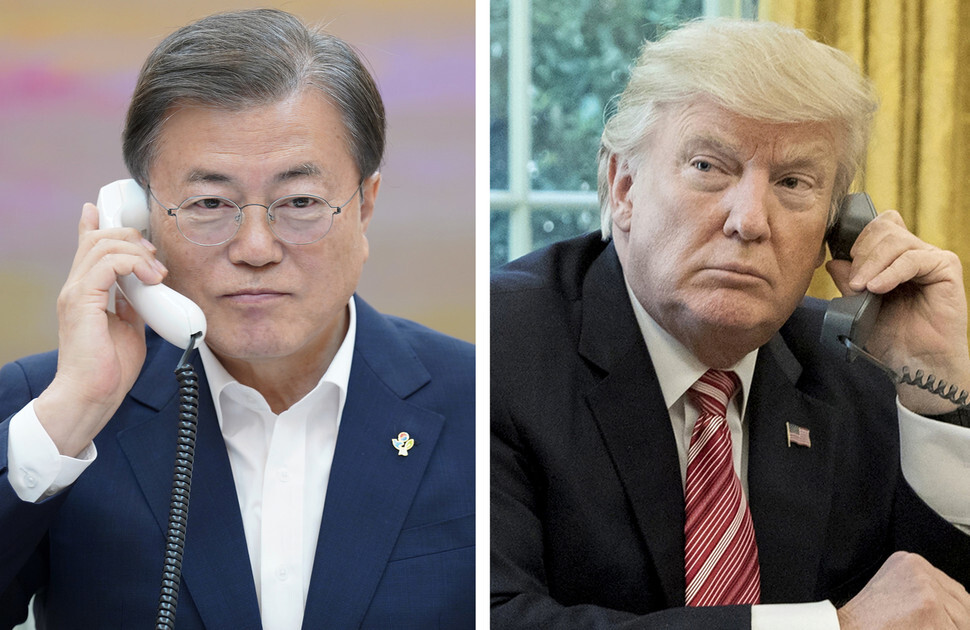hankyoreh
Links to other country sites 다른 나라 사이트 링크
[Editorial] S. Korea needs to cooperate with both the US and China without taking sides

South Korean President Moon Jae-in responded to US President Donald Trump’s request to attend the G7 summit in a telephone conversation on June 1. Blue House Spokesperson Kang Min-seok quoted Moon as saying there was “no need at all to dodge” Trump’s invitation and referring to it as “something to welcome.”
Kang explained that it would “help improve our national stature and benefit the national interest if South Korea becomes an official member of a ‘G11’ or ‘G12’ framework.” The G7 system began in the 1970s with a meeting of finance ministers from the “G5” countries at the time (the US, the UK, France, Germany, and Japan) to respond to a petroleum crisis. As Trump said, the system is “outdated” when it comes to responding to the unprecedented situation of the COVID-19 pandemic.
Moon also responded enthusiastically to Trump’s idea of expanding and reorganizing the G7 framework. Before the two leaders’ phone call, some experts had predicted Moon would show a cautious stance in consideration of the heated conflict under way between Washington and Beijing, but this proved to be off the mark. His proactive response appeared to reflect his confidence over South Korea being lauded as a “model of disease prevention” by the international community amid its response to the virus. He also signaled his aim of taking advantage of the opportunity to catapult South Korea into leading power status in the post-coronavirus era.
Responding to concerns that the summit might turn into an occasion for “allying against China,” the Blue House noted that the two leaders’ conversation included no references to China or Hong Kong issues. But with Moon having agreed to taking part in the expanded G7 summit being spearheaded by Trump, Seoul finds itself plunged into the vortex of US-China conflict whether it likes it or not. Speaking about the expansion and reorganization of the G7 framework, a White House official clearly stated that the aim was to “talk about how to deal with the future of China.” India and Australia, two of the other countries that Trump invited besides South Korea, are both key players in the “Indo-Pacific Strategy” that he is pursuing to contain China.
In his conversation with Trump, Moon said if the G7 summit does go ahead, it will be a milestone for the post-coronavirus era. His message was that while he was agreeing to the US’ request to take part in a larger, reorganized G7, he aims to restrict the focus to international cooperation on responding to the coronavirus. He was also deliberately distancing himself from Trump’s aims of building an anti-China alliance.
Going forward, South Korea-China relations will need to be separated from the expanded G7 issue and approached in terms of specific major issues. We will need to formulate principles for major points of contention in relations with Beijing in different areas: trade and the economy, the North Korea nuclear issue and security, the Hong Kong issue and human rights, and so forth. We will also have to take maximum advantage of the trust we have established with China in our coronavirus response, including the simplified immigration procedures for businessmen.
Another thing we should actively consider to reduce the burden of the US-China conflict is an approach based on multilateral diplomacy, where countries holding similar positions all work together. An example of this was the joint statement from the UK, Australia, and Canada expressing “deep concern” about the Hong Kong security act. As the coronavirus situation deals a blow to the leadership of the established powers, there is a possibility for middle powers like us to enjoy a greater voice in a G11 or G12 framework. Stronger diplomatic efforts to promote solidarity among similar middle powers are another approach worth considering.
Please direct comments or questions to [english@hani.co.kr]

Editorial・opinion
![[Column] Park Geun-hye déjà vu in Yoon Suk-yeol [Column] Park Geun-hye déjà vu in Yoon Suk-yeol](https://flexible.img.hani.co.kr/flexible/normal/500/300/imgdb/original/2024/0424/651713945113788.jpg) [Column] Park Geun-hye déjà vu in Yoon Suk-yeol
[Column] Park Geun-hye déjà vu in Yoon Suk-yeol![[Editorial] New weight of N. Korea’s nuclear threats makes dialogue all the more urgent [Editorial] New weight of N. Korea’s nuclear threats makes dialogue all the more urgent](https://flexible.img.hani.co.kr/flexible/normal/500/300/imgdb/original/2024/0424/7317139454662664.jpg) [Editorial] New weight of N. Korea’s nuclear threats makes dialogue all the more urgent
[Editorial] New weight of N. Korea’s nuclear threats makes dialogue all the more urgent- [Guest essay] The real reason Korea’s new right wants to dub Rhee a founding father
- [Column] ‘Choson’: Is it time we start referring to N. Korea in its own terms?
- [Editorial] Japan’s rewriting of history with Korea has gone too far
- [Column] The president’s questionable capacity for dialogue
- [Column] Are chaebol firms just pizza pies for families to divvy up as they please?
- [Column] Has Korea, too, crossed the Rubicon on China?
- [Correspondent’s column] In Japan’s alliance with US, echoes of its past alliances with UK
- [Editorial] Does Yoon think the Korean public is wrong?
Most viewed articles
- 1[Column] Park Geun-hye déjà vu in Yoon Suk-yeol
- 2Thursday to mark start of resignations by senior doctors amid standoff with government
- 3Kim Jong-un expressed ‘satisfaction’ with nuclear counterstrike drill directed at South
- 4[Column] ‘Choson’: Is it time we start referring to N. Korea in its own terms?
- 5N. Korean hackers breached 10 defense contractors in South for months, police say
- 6Will NewJeans end up collateral damage in internal feud at K-pop juggernaut Hybe?
- 7Why Korea shouldn’t welcome Japan’s newly beefed up defense cooperation with US
- 8[Editorial] New weight of N. Korea’s nuclear threats makes dialogue all the more urgent
- 9[Guest essay] The real reason Korea’s new right wants to dub Rhee a founding father
- 10[Column] Yoon’s first 100 days should open our eyes to pitfalls of presidential system